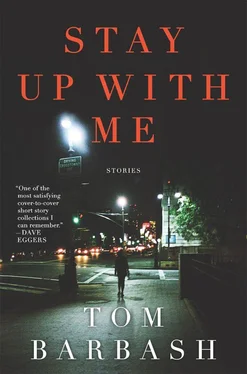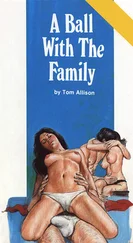Kistler had the sensation of floating outside his body, watching himself with these men, shooting the breeze and sucking down a beer. What he should do to do this right is to live in the hamlet a while to get a feel for it. He pictured himself doing this, people gradually becoming more comfortable with him and taking him into their confidence. He wondered what their impressions were of him. He realized the man with the red face had finished making a point and he hadn’t heard a word of it.
Kistler nodded. “I agree,” he tried.
“You agree?” the man said. Kistler realized he’d answered wrong.
“You agree?” the man said again and snorted. “He agrees,” he said.
Kistler rose from his seat. He pushed the smoke away. “Can I get anyone another beer?” he asked.
That evening Kistler e-mailed the photos of the hamlet to his editor with a note that read “Richest nation in the world.”
It had been a month since Kistler’s girlfriend broke things off with him, and her absence had left him feeling disconnected and isolated. In the fall, when she was living in Boston and he’d gone to visit for the weekend, they’d agreed to make lists of the things they didn’t like about each other — the issues they needed to work on. Kistler had been critical but honest, and he expected no less from her. They exchanged sheets and her page was blank with a heart on it. Kistler tried to grab his back but she kept it and read it all the way through. She said nothing afterward and even thanked him for his honesty, but it set them off balance.
Their habits diverged. She started talking about sea kayaking and cross-country skiing and bike trips she was taking with friends he didn’t know. He was pale and tired, and exercise was something he could barely recollect.
Valentine’s Day she called Kistler at the office and told him there was no point in dragging this out. She was spending the night with someone else. She then sent him back his sheet of paper.
Kistler lived in the downtrodden section of town in a one-bedroom apartment above a barbershop. He showed his parents the place when they visited and the look on his father’s face seemed reason enough to stay awhile. “This is the way people live,” he told his father. “The way you live is a completely foreign concept to people around here.”
He heated the leftover lasagna he’d made over the weekend and turned the TV on to CNN. A reporter was speaking through the brattle of gunfire somewhere in Iraq. Kistler found his mind drifting to the men in the diner. He wondered if he’d made an ass of himself somehow.
In the morning Kistler interviewed Helen, a short, plump woman with a thick swirl of blond hair, on the front steps of her trailer. Under her coat her T-shirt hugged her stomach. The snow whipped across her lawn like litter, spraying the windows, piling at the plastic that gathered like a sheath around her antennae.
“I’m trying to talk to everyone, see where they work, how long they’ve lived here,” Kistler said.
“I don’t work. I take care of them,” she said, pointing to the gang of children screaming and leaping in the snow. Kistler guessed there were seven.
“How long have you lived here?”
“I don’t know, maybe two years? Can we wait on this until my husband gets back from the store? He wants to be in on this, he said.”
“I just need a minute. Can I come inside for a minute?”
She paused, looking Kistler over, and he saw his chance.
“Two minutes. It’s no big deal,” he said. She opened the door.
Once inside he scanned the living room: the red plastic couch, the stuffed animals, and old dolls and board games strewn about.
Helen poured Kistler a glass of coffee, and on the brown couch in her living room he asked about the fire.
“They burned it down. They set their own fire department on fire to collect the insurance — three of them from the department. Your newspapers went wild. A fireman committing arson is big news. It got to be sort of a joke. I was in high school then and they rode us about it pretty hard. And then there was the lice business.”
“What was that?”
“Oh, the kids had lice a few years back and they had to run tests on them. There are a lot of mean things people say about the place. You know, that we’re arsonists, that our kids are having incest. When you grow up here you get used to thinking of yourself a certain way,” she said. “Now I read a good deal, and I’ve got family in Rochester and Albany so I know different.”
“Have you thought about moving somewhere else?”
“I really haven’t.”
“Why not?”
“Oh, you know. This is my home. I live here,” she said.
“Of course,” Kistler said.
Saturday, Kistler called the schools department to talk about Paris. The superintendent told him the lice story was true. He asked the county social services department about the unemployment rate and outbreaks of birth defects and incest. He asked a farm psychologist about sexuality in isolated areas. He called a teen pregnancy center to find out how many of their clients came from Paris. They gave him the number of a fifteen-year-old client, who he interviewed on the promise he wouldn’t use her real name. He pulled old clips on the firehouse fire, gathered stats from Pulaski, another town near there, for comparison. The Paris General Store manager gave him the liquor and cigarette sales figures and told him about four men he knew who spent most of their welfare checks on lottery tickets.
He took quotes from an apple farmer who told him he couldn’t get people in town to pick.
“I’ve got migrants that come in from Florida and Texas that are making ten, fourteen dollars an hour sometimes. But almost no one around here will do it. They’ll pack the boxes and I pay less for that,” the man said.
The man told Kistler social services had become a trap for the people in Paris.
“If they work, they got to give the sitter eight bucks an hour, right? So in the long run they figure it doesn’t pay,” he said. Kistler wrote the quote down and put a star next to it.
The piece, when it was finished, was strong, Kistler knew. There were no quotes that weren’t corroborated, no facts stated without statistics. He had not editorialized. And beyond all, the pictures were vivid. There was a shot of the diner, the regulars playing cards or laughing behind beers and plates of food. Another shot of the vacant factories and two of the trailer park. It was as compelling a portrait of rural poverty as he had seen.
When he sent the story in, his editor called him.
“This is staggering stuff,” he said.
The story ran the next morning with pictures of the trailer park and the diner. Kistler’s prose ran two full pages.
He would not have chosen the headline: “The Town Time Left Behind,” with the subhead “No Springtime in Paris.” A bit too flippant, Kistler thought, but the article was left mostly untouched.
At ten, the county social services director called to say his whole family had read it. “It carries an important message,” he said.
Another reader from Syracuse called a half hour later. “Imagine living like that,” she said. “And all those children. It made me feel a little more fortunate, I’ll tell you that much.”
Then a man from Paris whom he hadn’t met called to say the paper had sold out in Paris, in Albion, in Pulaski, in Williamstown. He didn’t speak to Kistler. Instead he called the editor. He said the article pointed to a lot of matters that needed discussing and he invited “the reporter” out to an impromptu meeting.
The word spread around the newsroom that Kistler’s story had caused a stir. The managing editor read it. The publisher looked it over. Every ten minutes or so Kistler’s phone rang.
Читать дальше












